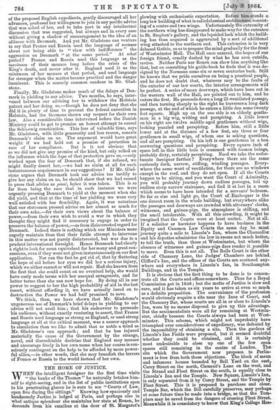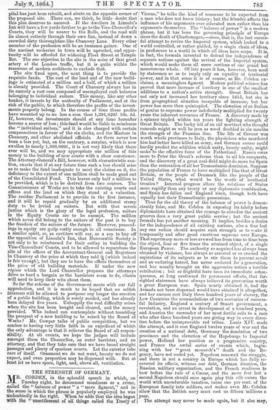THE HOME OF JUSTICE.
WHEN the intelligent foreigner for the first time visits "the banks of the Thames" he naturally betakes him- self to sight-seeing, and in the list of public institutions open to his penetrating glance he is sure to see "Courts of Law, open free during the sittings." Knowing how spaciously and handsomely Justice is lodged at Paris, and perhaps also in what antique splendour she maintains her state at Rouen, he descends from his omnibus at the door of St. Margaret's glowing with enthusiastic expectation. Before him stands a long low building of what is called classical architecture, consist- ing of a centre and two wings. Unfortunately the extremity of the northern wing has disappeared to make way for the entrance to St. Stephen's gallery, and the lopsided look which the build- ing has thus acquired is aggravated by a sort of additional wing attached to the northern end. This extension is in very debased Gothic, so as to prepare the mind gradually for the front of Westminster Hall. The Hall once entered, the hopes of our foreign friend, cruelly dashed by what he has seen outside, revive. Neither Paris nor Rouen can show him anything like that, but on consulting his guide-book he finds that it was de- signed by the Normans some six or seven centuries back. Still he knows that we pride ourselves on being a practical people,.
and he does not doubt that, whatever may be the faults of the exterior of our law courts, the interior arrangements will be perfect. A series of mean doorways, which have been cut in the western wall of the Hall, are pointed out to him, and he enters the first. He proceeds down a long ill-ventilated passage, and then turning sharply to the right he traverses a long dark passage, at the end of which he enters a little den some twenty feet square. High up on the one side is an elderly gentle- man in a big wig, writing and perspiring. A little lower on his right are twelve middle-aged gentlemen without wigs, looking puzzled and perspiring. Before him, still a little lower and at the distance of a few feet, are three or four gentlemen in small wigs, of whom one is asking questions, and all are perspiring. On his left is one gentleman in a box answering questions and perspiring. Every square inch of space left in this little hole is crammed with human beings, probably dirty, certainly perspiring. Need we take the unfor- tunate foreigner further ? Everywhere there are the same curiously dark, narrow, stifling, winding passages. Every- where the same want of ventilation, for there are no windows except in the roof, and they do not open. If all the Cou.rts happen to be sitting, and you want the Court of Admiralty, you will probably journey down endless passages, toil up endless steep narrow staircases, and find it at last in a room which seems to have been intended for a servants' bedroom. So far as size and light go, the Court of Exchequer is the one decent room in the whole building, but everywhere alike the passages and doorways are crowded with attorneys' clerks, witnesses, and guinea-pigs, the atmosphere is stifling, and the smell intolerable. With all this crowding, it might be imagined that the Courts were at least united. Not at all. If a solicitor or barrister happens to have business in the Equity and Common Law Courts the same day he must journey quite a mile to Lincoln's Inn, where the Chancellor and his deputies administer the law in rooms not much better, to tell the truth, than those at Westminster, but where the absence of witnesses and guinea-pigs does render it possible to move. Even this is not all. The Rolls Court is the other side of Chancery Lane, the Judges' Chambers are behind Clifford's Inn, and the offices of the Courts are scattered any- where and everywhere in Lincoln's Inn, in Southampton Buildings, and in the Temple.
It is obvious that the first thing to be done is to concen- trate all the Courts and offices somewhere. Thus far a Royal Commission got in 1858; but the motto of Justice is slow and sure and it has taken us six years to arrive at even so much as a:definite proposition. The convenience of the profession would obviously require a site near the Inns of Court, and the Chancery Bar, whose courts are all in or close to Lincoln's Inn' were by no means disposed to give up this advantage. But the sentimentalists were all for remaining at Westmin- ster, chiefly because the Courts always had been at West- minster. This scheme, which might not improbably have triumphed over considerations of expediency, was defeated by the impossibility of obtaining a site. Then the gardens of Lincoln's Inn Fields were proposed, but it seemed doubtful whether they could be obtained, and it is certainly most undesirable to close up one of the few open spaces still remaining in the centre of London. The site which the Government now proposes to Parlia- ment is free from both these objections. The block of mean and infamous houses bounded by Bell Yard on the east, Carey Street on the north, Clement's Lane on the west, and the Strand and Fleet Street on the south, is equally close to Lincoln's Inn and the Temple. New Square' Lincoln's Inn, is only separated from it by Carey Street, and the Temple by Fleet Street. This it is proposed to purchase and clear. Temple Bar, which the Bill carefully preserves, may perhaps at some future time be made into a bridge, so that the Tern- piers may be saved from the dangers of crossing Fleet Street. Meanwhile it is consolatory to know that King's College Hos- pital has just been rebuilt, and abuts on the opposite corner of the proposed site. There can, we think, be little doubt that this plan deserves to succeed. If the dwellers in Lincoln's Inn will have a few yards further to go to the Vice-Chancellor's Courts, they will be nearer to the Rolls, and the road will lie almost entirely through their own fen, instead of down a crowded dirty thoroughfare like Chancery Lane. Every other member of the profession will be an immense gainer. One of the nastiest rookeries in town will be uprooted, and oppor- tunity will be afforded for widening Fleet Street at Temple Bar. The one objection to the site is the noise of that great artery of the London traffic, but it is quite within the resources of modern architects to exclude that.
The site fixed upon, the next thing is to provide the requisite funds. The cost of the land and of the new build- ings is estimated at a million and a half, of which a million is already provided. The Court of Chancery Always has in its custody a vast sum composed of unemployed cash balances belonging to individual suitors. This money, like any other banker, it invests by the authority of Parliament, and at the risk of the public, to which therefore the profits of the invest- ments properly belong. In the course of time these profits have mounted up to no less a sum than 1,291,629/. 10s. 5d. If, however, the investments should at any time hereafter become a source of loss; this fund would be liable to reimburse the "individual suitors," and it is also charged with certain compensations in favour of the six clerks, and the Masters in Chancery, and other abolished officials. As there never has been a loss yet, but, on the contrary, a surplus, which is now swollen to nearly .1,300,000e, it is not very likely that there ever will be, and we may appropriate one million of this money to the building of new courts with a clear conscience. The Attorney-General's Bill, however, with characteristic cau- tion, enacts that if at any future time such a loss should arise as to make the fund inadequate to meet the claims on it, the deficiency to the extent of one million shall be made good out of the Consolidated Fund. This leaves only half a million to be provided, which is to be derived from two sources. The Commissioners of Works are to take the existing courts and offices and the land on which they stand at a valuation. The residue Parliament is to provide in the first instance, and it will be repaid gradually by an additional stamp duty to be levied on suitors. But with that severe justice which is the glory of the legal profession, suitors in the Equity Courts are to be exempt. The million which never did belong to the suitors of the past is to buy the freedom of the suitors of the future. However, proceed- ings in equity are quite costly enough in all conscience. In a similar spirit, or, as cavillers will say, as a sop to buy off the opposition of Lincoln's Inn, that Honourable Society is not only to be reimbursed for their outlay in building the Vice-Chancellors' Courts, and to be allowed to repurchase the site of the offices of the Accountant-General and Registrars in Chancery at the price at which they sold i (which indeed is fair enough), but they are to have the offices themselves at the price of old building materials. If under the new rigime which the Lord Chancellor proposes the attorneys drive as hard a bargain as the barristers seem to do, clients will need to keep their wits about them. So far the scheme of the Government meets with our full approbation, and it is much to be hoped that no selfish interests will be allowed to postpone any longer the erection of a public building, which is sorely needed, and has already been delayed five years. Unhappily the real difficulty arises when the site has been bought and cleared, and the money provided. Who indeed can contemplate without trembling the prospect of a new building to be raised by the Board of Works ? Mr. Cowper talks of public competition, but we confess to having very little faith in an expedient of which the only advantage is that it relieves the Board of all respon- sibility. At all events, we hope the judges will include amongst them the Chancellor, an outer barrister, and an attorney, and that they take care that we have broad straight passages and plenty of spacious courts. Let the exterior take care of itself. Ornament we do not want, beauty we do not expect, and even proportion may be dispensed with. But at least let us have space, light, and, above all, ventilation.































 Previous page
Previous page